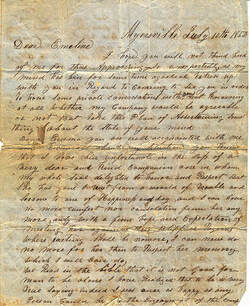
"We read in the Bible that it is not good for man to be alone. I have realized that to be a very true saying indeed. I was once as happy as any person could be in the enjoyment in the company of my much-lamented Mary, but how different my case. With all I have I have no enjoyment & some of my best friends have told me that I need not expect to be happy anymore unless I would marry again and have advised me to do so, although I do not wish to do so for some time yet. But I have come to the conclusion to do so providing I can suit myself. I now feel like a lost sheep, lonely and without anyone to cheer me or comfort me, and if it was not for the comforts and the consolations of religion, I would often times have to despair in sorrow. But thanks be to God that he still comforts and consoles me. I find that I can never be happy again in this world without fixing my affection on one again in who I am satisfied will be a kind companion to me, and dear Emeline, you appear to the only one I can have any idea of going to see at the present and of fixing my affection upon."
The plaintive writer of this remarkable missive was born 28 February, 1819, on a farm in Foxville, Frederick County, Maryland. Joseph Brown was in Myersville by 3 October, 1843, when he married a local girl named Mary Doub. They had three daughters then Mary died 3 February, 1852, of unknown causes. After fixing his mind on the idea of remarriage, Brown cast a mental net for possible candidates and came up with Emeline Hoffman, his late wife’s younger half-sister. When Joseph Brown wrote to her, Emeline was nineteen years old.
To read the full article by historian Ann Longmore-Etheridge, click here.
The plaintive writer of this remarkable missive was born 28 February, 1819, on a farm in Foxville, Frederick County, Maryland. Joseph Brown was in Myersville by 3 October, 1843, when he married a local girl named Mary Doub. They had three daughters then Mary died 3 February, 1852, of unknown causes. After fixing his mind on the idea of remarriage, Brown cast a mental net for possible candidates and came up with Emeline Hoffman, his late wife’s younger half-sister. When Joseph Brown wrote to her, Emeline was nineteen years old.
To read the full article by historian Ann Longmore-Etheridge, click here.
 RSS Feed
RSS Feed